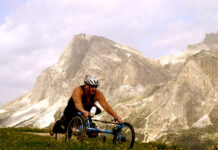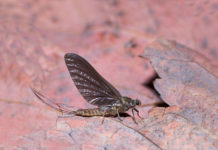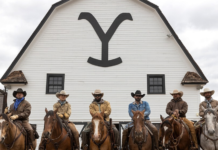Written by: William G. Tapply
Photo by Harold F. Blaisdell from Tap’s Tips: Practical Advice for All Outdoorsmen
A secret, shared stream represents four decades of memories.
We usually rumble across the iron bridge, turn off the road, follow the bumpy ruts beside the field, and park Dad’s station wagon at the water’s edge to offload the canoe. But on this gray afternoon in January, we’ve come in my car, and we have to leave it beside the road and slog through knee-deep snow to the stream.
Today we leave the rods in the car. We haven’t bothered with the canoe.
I brush the snow off a boulder beside the water for Dad and then perch on my own rock next to him.
“Looks kinda different in the winter, huh?” he says.
The black currents flow against the crusty ice along the banks and swirl slowly around the bridge abutments. The alders and willows are black and skeletal against the snow. The sky overhead is leaden. The winter air carries the taste of more snow.
“No mayflies today,” I offer.
Dad laughs quietly. “I can count the mayfly hatches we’ve encountered here on the fingers of one hand. Objectively, it’s not much of a trout stream.”
“But we do love it,” I say.
“That we do,” he says softly.
We’ve been coming to this little stream for nearly forty years. We discovered it soon after Dad moved to New Hampshire, and over the years we’ve explored its entire twenty-odd miles. It empties a spring-fed trout pond, meanders through pine-and-hardwood forest, opens up for a couple of miles in a bog, and reenters the forest before it dumps into the lake. We know every pool and run and riffle, every eddy and backwater and hole, and I guess at one time or another we’ve caught trout from all of them. We’ve been skunked plenty of times, too. We’ve packed away a lot of memories here.
We’ve always come with the same purpose: to have some time with each other. Sharing a canoe on a quiet woodland trout stream for an afternoon, taking turns paddling and casting, has been our way of staying connected. The fishing is quite secondary, although before today we never considered leaving our fly rods behind.
It’s a wild, pretty little stream, mayflies or no mayflies. In June the cardinal flowers and wild irises and marigolds splash patches of color over the banks, and in the fall the maples form a crimson-and-gold canopy overhead. We’ve rounded a bend, paddling or pushpoling quietly, and found deer and, on a couple of occasions, a moose standing in the shallows. Kingfishers and herons hunt trout here, and migrating warblers swarm in the bushes in the fall. We’ve flushed wood ducks and black ducks and mallards. We’ve always planned to come back in October for a shotgun-and-fly-rod float, but grouse season has inevitably distracted us.
What we’ve liked best of all about our stream is its inaccessibility. Just two bridges cross it–this iron bridge at about the halfway mark and the highway bridge near the stream’s terminus. Its brush-clogged mud banks and silty bottom make it impossible to wade or fish from shore. The only way is from a little canoe, the way we’ve always done it. There are rocky riffles that we’ve had to drag over in low-water years. Enough uprooted pines lie across the water to discourage recreational canoeists and kayakers. They have never discouraged us.
We’re thankful that our stream does not appear on the state’s list of stocked waters. The New England brook trout that live here were either born in one of its tiny tributaries or have wandered up or down from the ponds at either end.
Except for the occasional kid dangling a worm from one of the bridges, in forty years we have never encountered another fisherman here.
Dad and I sit there beside each other, watching the dark January water flow past us. Forty years, a hundred trips, at least. I’m having vague thoughts of immortality and eternity, thoughts that swirl in my mind like the black currents in our stream, elusive, opaque thoughts I can’t quite sink a hook into. Past, present, and future mingle, the river and the memories . . . .
* * *
It’s a sunny Saturday in May, or maybe June or September. I’ve driven to New Hampshire to spend some time with my father. His wagon is parked in the driveway. He’s already strapped on the canoe, packed corned-beef sandwiches and bottles of Hires root beer in the basket, stowed the fishing gear. He’s waiting for me in the yard, pretending to be busy weeding a flower garden or repairing a bird feeder. When I pull in, he looks up, waves, glances at his watch. I’m early. I’ve been looking forward to this all week. He has, too, I know.
A half hour later we cross the iron bridge. We offload the canoe, stow the gear, rig the rods. We argue about who will start in the bow with the rod and who will paddle. It’s an argument I have never won. Dad always asserts his seniority and takes the stern seat.
He pushes us upstream. I sit up front and scan the water for the dimple of a rising trout. Now and then he digs in his paddle and holds the canoe. He says nothing, but after all these years, no words needed. I know he wants me to drift my bushy dry fly through that current seam or along that shaded undercut bank or against that boulder. We both remember a time when we took a trout there.
Where the stream meanders through the bog, Dad grabs a branch to hold us still. “Listen,” he whispers.
It’s the weird, booming pump-er-lunk call of the bittern, a haunting, wild sound that never fails to make me shiver, a sound I will forever associate with our stream, with Dad. It sounds close, and we look hard. But as often as we’ve heard Mr. Bittern, we’ve never once been able to spot him.
After a couple of hours, we beach the canoe and sit on a sunny patch of grass with the picnic basket between us. We discuss baseball, politics, religion, economics. We disagree on a lot of things. I call him a stubborn old Yankee. He calls me a crazy communist. We like to debate. But we never argue. We listen to each other, and we learn from each other.
When the sandwiches and root beer are gone, we lie back on the grass. We listen to the music of the birds and the water, and we gaze up through the lacy tree branches to the sky, and it’s easy to wind back through the years to all the other times Dad and I have been together at this stream, or at some other stream. It never mattered where we were or whether we caught many trout. Time and place were irrelevant as long as we shared them.
Dad murmurs, “It’s good to get out, isn’t it?”
“Yes,” I say quietly. “It’s always good to get out.”
After a while, he stands up and stretches. “Let’s go catch some trout.” He tries to take the paddle.
I grab it from him. “My turn,” I say.
“I’d rather paddle.”
“So would I. Don’t be selfish.”
He grumbles, of course, but he takes the bow seat and picks up the rod. We’ve done this a hundred times. We both love to fish.
We drift downstream. Dad roll-casts his little bucktail against the bank. He’s as effortless and graceful and accurate as ever. Watching him from behind, I can almost convince myself that nothing has changed in forty years, that the stream will always be here, and we will, too. . . .
* * *
“You must be getting cold,” Dad says.
“You taught me not to complain,” I reply. “How about you?”
“Ha, ha,” he says. “Very funny.”
Hard little snowflakes are spitting down from the low January sky. I haven’t noticed them till just now. “Storm coming,” I say.
“Won’t bother me,” he says. “But maybe it’s time.”
I nod and stand up. “Okay. It’s time.”
Dad’s ashes swirl and disappear in the dark currents, mingling with our stream and with our memories.
“You’re on your own this time,” I tell him. I lift my hand. “Tight lines.”
Then I turn and trudge across the snow-covered field to my car, on my own for the first time in my life.
Editor’s note: When I was the editor of American Angler, I had the pleasure of working with William G. Tapply for ten years before his death in the summer of 2009. Bill’s wife, the author Vicki Stiefel, has graciously allowed me to reprint some of his columns and articles here.
Click here to check out all books by William G. Tapply available on Amazon.
Credit: Source link































